NEWSNIGHT LIVEpublished at 10:25
Monday 29th June
Stories today include the Prime Minister's response to the terror attack in Tunisia, and the latest in the Greek debt crisis.
Occasional updates and analysis from the Newsnight team
Monday 29th June
Stories today include the Prime Minister's response to the terror attack in Tunisia, and the latest in the Greek debt crisis.
Robert Morgan, Assistant Editor, BBC Newsnight
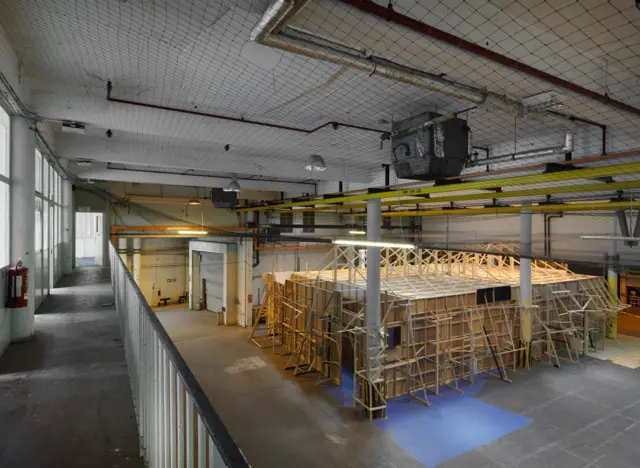 Image source, Marcus J Leith
Image source, Marcus J LeithBen Rivers' art installation at the old BBC TV Centre
The former headquarters of the BBC in White City, west London, where shows such as Newsnight were once produced, is re-opening its doors to the public today for Artangel’s latest commission, a cinematic installation by the UK artist Ben Rivers.
"The Two Eyes Are Not Brothers" is based around former scenery and props workshops in the Drama Block of the famous BBC TV Centre, which closed in 2013. Viewing rooms constructed from salvaged film sets are also used to screen parts of the work. Ben Rivers has adapted a short story set in Morocco by the American author Paul Bowles. The story was originally written in 1947.
Rivers described the installation as a film “about the construction of film-making”. According to the Artangel website, Rivers’s “practice treads a line between documentary and fiction”.
The BBC decided to sell Television Centre in 2012 to developer Stanhope and move staff to the re-developed Broadcasting House in central London and MediaCity in Salford, as part of a plan to save money and have bigger production centres outside London.
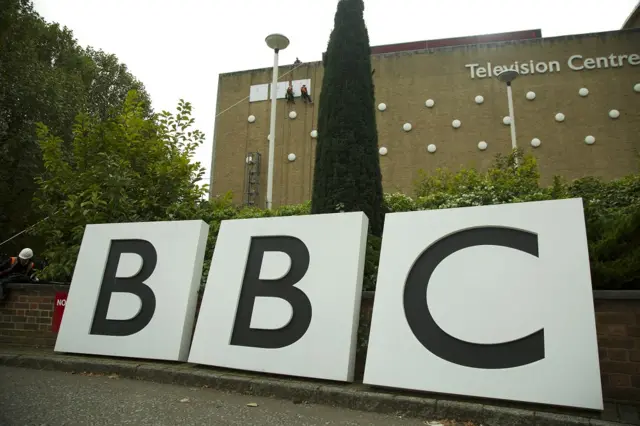
BBC TV Centre when the developers took over
 Emily Maitlis
Emily Maitlis
Newsnight Presenter
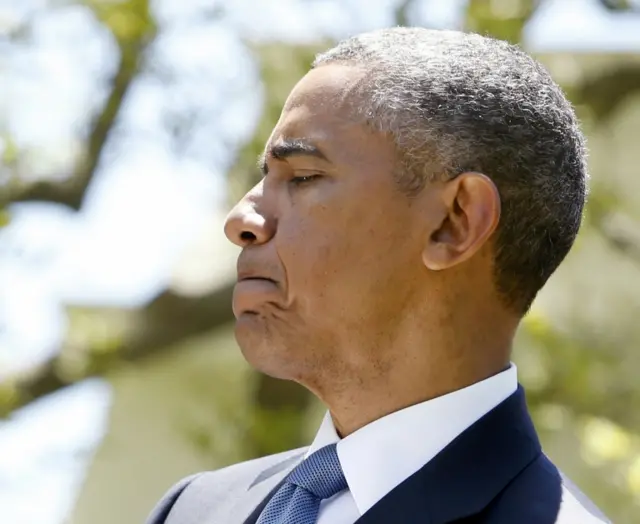 Image source, Reuters
Image source, ReutersPresident Obama will head to Charleston today to honour those who died at the hands of a suspected mass murderer and white supremacist, who told his friends he wanted to start a race war.
Obama will eulogise the Reverend Clementa Pinckey, whom he knew personally, and the eight other black men and woman who were gunned down in a Church as they took Bible study. His presence no doubt will be welcome. And yet. And yet.
There was a strong sense - from those I talked to when I was there in Charleston this time last week that they felt let down by President Obama. Here finally was a black president. The man whose very presence in the most prestigious job on earth should signify the civil rights movement had won. But again and again from those working for the rights of black Americans I heard a sense of despair when they talked about their President. A man, they claimed, too frightened of losing the white middle class vote to properly take on the issue of race.
Is that right? A comment from White House spokesman Josh Earnest is revealing. He tells us: "The focus of the President’s remarks will be on celebrating the lives of those who were lost on that tragic night last week". Of course, you might say, this is a memorial visit not a stump speech. But to use a word like "tragic" suggests an awful weary acceptance and inevitability of an event that was by all accounts calculated, hate fueled and possibly even preventable.
He has spoken of race in regard to the Charleston shootings – but the interview he gave last week was pretty much drowned out by his controversial use of the "n" word.
But this - to remind you is what he said, with progress as his theme. “It’s because societies don’t turn 50 degrees; democracies certainly don’t turn 50 degrees. And that’s been true on issues of race. That’s been true on issues of the environment. That’s true on issues of discrimination. As long as they’re turning in the right direction and we’re making progress, then government is working sort of the way it’s supposed to.” The Obama you see here is a President who is happy to elide race, the environment and discrimination into one sound bite.
He doesn’t want to be America’s Black President. He just wants to be the American President.
Robert Morgan, Newsnight Assistant Editor
A man has been beheaded and at least one other person injured in a suspected Islamist attack on a gas factory near the French city of Lyon. There were several small explosions, possibly caused by gas canisters, at the Air Products factory in Saint-Quentin-Fallavier. A man has been arrested by anti-terror police. Reports suggest two attackers drove into the factory carrying a flag with Arabic writing on it.
French President Francois Hollande is set to leave the EU summit in Brussels this afternoon and return to France. He is expected to give a news conference before travelling.
A few months ago Evan Davis interviewed Christiane Taubira, the French Justice minister. She discussed community relations in the wake of the Charlie Hebdo terror attacks. You can watch it below:
Allow YouTube content?
This article contains content provided by Google YouTube. We ask for your permission before anything is loaded, as they may be using cookies and other technologies. You may want to read Google’s cookie policy, external and privacy policy, external before accepting. To view this content choose ‘accept and continue’.
 Duncan Weldon
Duncan Weldon
Economics correspondent in Athens
As I leave Athens the talks between Greece and it's creditors are on a knife edge. In many ways we are back were we where weeks ago: the two outstanding issues are debt restructuring and pension reform.
But unlike weeks ago, time is running short. With a deal Greece will almost certainly miss a payment to the IMF on Tuesday. If the ECB does as it is indicating and declines to offer the Greek banking system more emergency support after the current bailout ends on Tuesday, things could get very messy indeed, very quickly.
Analysts at JP Morgan today argued that without a deal by Monday, capital controls would have to be imposed to control deposit outflows ahead of Tuesday's deadline. That echoes the comments of Chancellor Merkel that a deal needs to be complete by market open on Monday.
It looks like the final deadline is finally upon us.
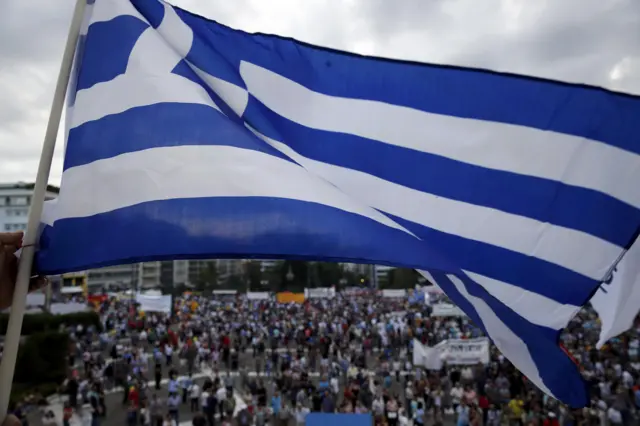 Image source, Reuters
Image source, ReutersFriday 26th June
Stories today include the latest on the Greek debt crisis, and Cameron's first attempt at negotiating for EU reform at the leaders summit.
Rwandan officials claim Karenzi Karake was in London for high level meeting
 Image source, AFP
Image source, AFPKarenzi Karake
The Rwandan spy chief arrested in the UK over alleged war crimes had come to London to meet the head of MI6, sources have told the BBC.
Karenzi Karake, the head of Rwanda’s intelligence services, was to meet Alex Younger last Thursday morning, but the meeting was cancelled at the last moment, according to those familiar with the general’s itinerary.
Earlier today Karake, 54, was awarded conditional bail at Westminster Magistrates Court ahead of a full extradition hearing in October.
He was arrested at Heathrow airport on Saturday under a European Arrest Warrant on behalf of authorities in Spain where he is wanted in connection with alleged war crimes against civilians.
In court today, lawyers acting for Karake, including Cherie Booth, QC, made clear they believe the charges against him are bogus and politically motivated.
Karake appeared in court wearing a green and yellow jumpsuit. He has been held since Saturday at Belmarsh high security prison in east London.
Whitehall sources neither confirmed nor denied details of MI6's engagement with Karake. The claim that he was due to meet Britain's most senior intelligence official will add to the political embarrassment over his detention.
By Nick Davies and Vinnie O'Dowd.
The democratic mandate doesn't fit with reality
 Duncan Weldon
Duncan Weldon
Economics correspondent
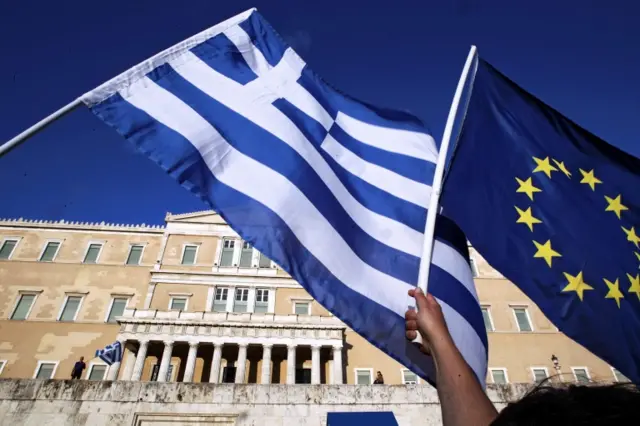 Image source, EPA
Image source, EPAEntering the Eurozone always meant signing up to a set of rules, to limiting freedom of manoeuvre for policy makers. In many ways that was, in much of Europe, sold as an attraction.
Locking yourself into a fixed exchange rate regime (an extreme version which was almost impossible to leave) allowed Southern European countries to piggy back on Germany's economic credibility.
In a previous, pre-euro crisis, countries like Greece and Italy would simply have devalued their currencies to boost exports and inflate debt. The problem being that that works as a short term solution but not a long term road to prosperity. The end result was uncompetitive economies and telephone number exchange rates for the Lira and Drachma.
But if countries entering the Euro knew they were giving up control of monetary policy, ending the easy option of devaluation & signing up to tough fiscal rules, that was one thing. What's happened recently is different.
Greece (and others before them) aren't just being asked to hit fiscal targets, the manner in which those targets are hit (the balance of spending cuts vs tax rises for example) are being imposed. Specific aspects of microeconomic policy - everything from the pension system to labour market law - are being argued about by the creditors.
The democratic mandate argument can be overplayed. If the Greek people voted for a unicorn each, the creditors have no duty or ability to comply. Democracy has to fit with reality.
But many worry the balance has swung too far.
The bigger issue at play at the moment is this: is Eurozone membership compatible with national democratic nation states?
The newspaper coverage is relentless
 Emily Maitlis
Emily Maitlis
Newsnight Presenter
 Image source, Science Photo Library
Image source, Science Photo LibraryA hedgehog
Don't get me wrong. We all love a hedgehog. This is not a personal attack on their stealth wisdom or beauty.
Thing is though , there seem to be quite a lot of them. Not in real life. Who ever sees them in real life? But in the Times newspaper.
At first I thought it was my own whimsical obsession. Then I started counting. It's definitely not me.
There have been a hundred and one mentions of hedgehogs in the past 12 months. That's almost as many mentions as the paper has of the defence budget.
Now you may say that's still not enough. But I would suggest someone at the Times has a hedgehog thing going on.
 Duncan Weldon
Duncan Weldon
Economics correspondent in Athens
There's rising talk inside Greece, and it's no longer confined to just the left of Syriza, that the creditors are trying to force a change of government. This is driven by their actions over the last week - saying on Monday that the Greek proposals were a good basis for discussion before presenting an almost entirely different plan and by the fact that the leaders of the opposition parities are all in Brussels.
Here's how that would work: The creditors present a plan that crosses Syriza's "red lines" and refuse to budge. Greece doesn't sign and the current programme ends on the 30th June. Greece misses a payment to the IMF on the 30th. When the programme ends on Tuesday, the ECB declines to extend more support to the Greek banks. Faced with heavy deposit outflows, capital controls are imposed. Against a backdrop of financial panic, a bank run and a liquidity starved economy, the government are forced to seek a fresh mandate. A more compliant government is elected.
The problem with this plan of course is what might be termed the "execution risk" in the final stage. Because an election fought on the grounds of "democracy vs the EU" could well return a Syriza government with a stronger mandate. But then the creditors haven't had a great track record of calling Greek politics well over the last five years.
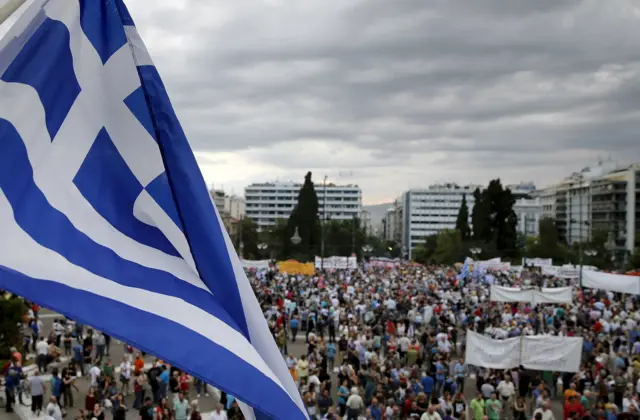 Image source, Reuters
Image source, ReutersAnti-austerity demonstrators in Athens this week
 Laura Kuenssberg
Laura Kuenssberg
Newsnight Chief Correspondent
David Cameron today is making his first serious attempt to present his demands for reform to his fellow European leaders en masse at the latest of their regular get togethers.
For him, this is an important day. For party reasons he has to show he is serious about making the renegotiations meaningful and actually that he will achieve something.
The problem is (one of many that will be discussed endlessly over the next eighteen months), right now the UK's domestic political shenanigans are just nowhere near the top of the EU's priority list.
One very senior diplomat who likes and respects David Cameron told me recently he has never seen the UK as isolated as it is now. Yes, there are countries who agree the EU needs change, but banging the drum for structural changes to the complicated mechanisms of the EU when it is struggling to contain the impact of two mammoth problems on its shores is perhaps not the way to make friends. If the PM is to achieve his aims of reforming our relationship with the EU, friends in the rest of the union are what he needs. Today, getting a real hearing may be the hardest thing to achieve.
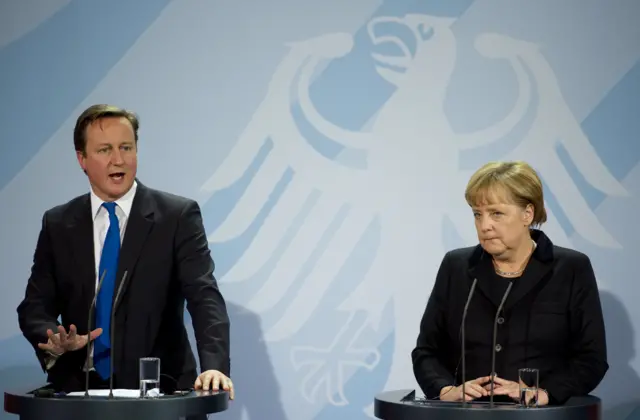 Image source, AFP/Getty Images
Image source, AFP/Getty Images Duncan Weldon
Duncan Weldon
Economics correspondent in Athens
Another day of talks, following another night of work by the "experts" trying to find a solution. I'm reminded of something once said by Per Jacobssen (a former head of the IMF), that an expert is a "man who can express the opinion of his government in technical terms". Because really this is a political negotiation dressed up as economic policy making.
To understand why, consider this: what is actually being debated is an eight month funding programme for Greece. It will last until early 2016, so all the much contested fiscal targets for 2016, 2017 and beyond are irrelevant to the immediate issue at hand.
Even leaving that aside, there is more art than science to agreeing whether the economics of this deal are sustainable. If the IMF is worried that package the Greeks have suggested would push the economy into recession, that could be offset by accounting for EU investment funds or the impact of QE (which Greece is not currently benefiting directly from). In other words if the will (on both sides) is there for a deal, then a way can be found to make the numbers add up.
The question then is, is the will actually there on both sides?
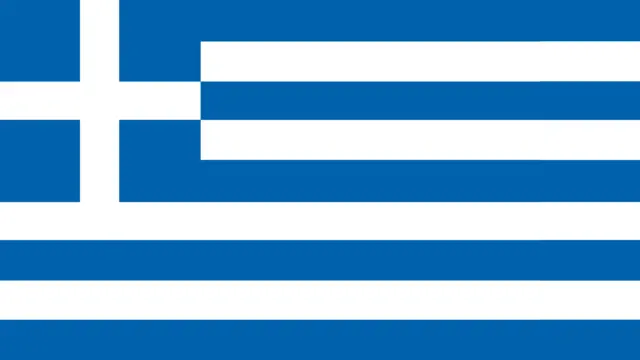 Image source, Public domain
Image source, Public domainThursday 25th June
Stories today include Greek debt crisis talks and Cameron opening negotiations on reform at the European leaders meeting tonight.
Robert Morgan, Newsnight Assistant Editor
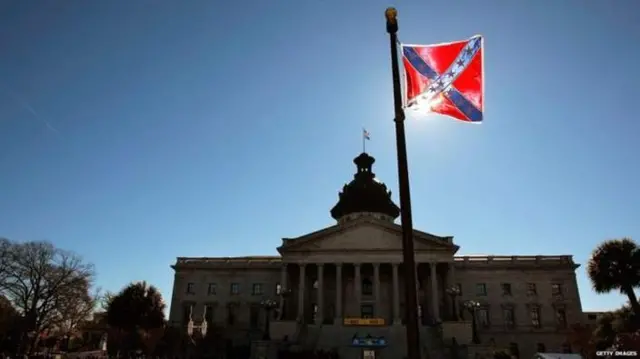 Image source, Getty Images
Image source, Getty ImagesPressure is growing to withdraw the Confederate battle flag across the US with Alabama Governor Robert Bentley today ordering the removal of four confederate flags in the state capitol grounds. Earlier this week South Carolina lawmakers called for its removal from the state house.
Efforts are under way in four other states - Texas, Mississippi, Virginia and Tennessee - to remove state-sponsored Confederate tributes. And some major retailers like Amazon and Walmart are also removing it.
The murder of nine parishioners at a historical black church in Charleston, South Carolina, last week renewed debate about the place of the flag in US culture. The suspect, Dylann Roof, has appeared in many photos holding the Confederate flag.
You can see Emily Maitlis' original report here, external.
It's hard to do well. But does it actually change anything?
 Ed Brown
Ed Brown
Newsnight producer
David Cameron gave the strongest indication yet at PMQs that he is considering changing the definition of child poverty. This is something that Conservatives have been toying with a while - there was a report, external for DWP in 2012 that looked at some of the options.
One of the problems that advocates for change have with the current definition (60% of median income) is that it can give us some slightly counterintuitive outcomes. To illustrate this, imagine an economy of ten people, with incomes of five to 50, as illustrated below - you'll notice I've named them from A - J as shorthand for poorest to richest:
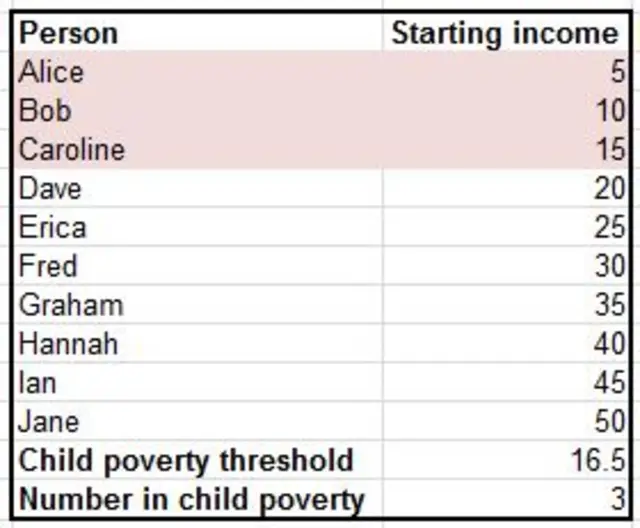
Alice Bob and Caroline have kids that are in child poverty.
Now imagine that there's a colossal recession, and everybody's incomes fall to the same level as Alice's:
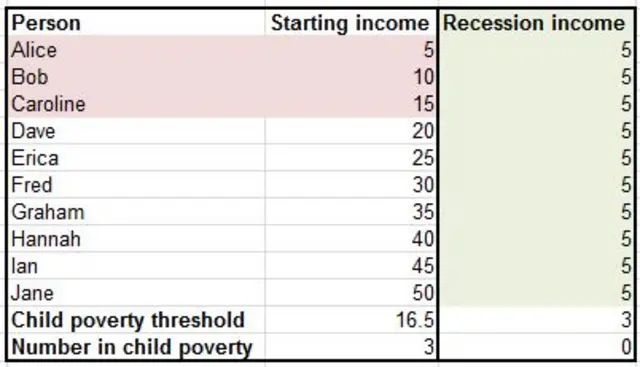
Now, despite everyone but Alice have seen a dramatic drop in their income, nobody has kids in child poverty on this definition. So Alice, Bob and Caroline have, on this measure, been lifted out of child poverty, despite having seen their incomes go down.
Finally, our mini economy bounces back - there's a boom, and almost everyone's incomes go up. Perversely, Alice, Bob and Caroline find themselves in child poverty again, despite having seen their incomes triple since the recession, and increase since before it - and Dave is pulled into child poverty too:
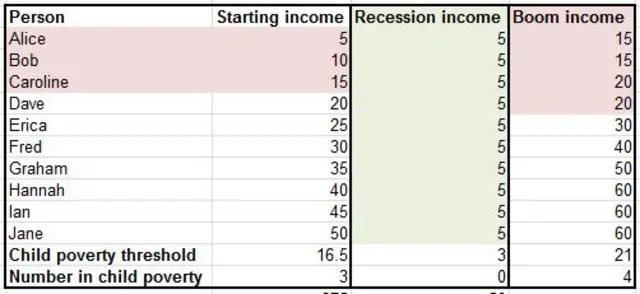
So, as you can see, it's perfectly possible for a family's income to increase substantially and yet for them to be measured as falling into child poverty. Or for it to go down and for them to be measured as coming out of child poverty.
But can we do any better than this as a measure? The DWP report from 2012 suggested that a basket of measures, some of them non financial should be used, namely:
1. Income and material deprivation 2. Worklessness 3. Unmanagable debt 4. Poor housing 5. Parental skill level 6. Access to quality education 7. Family stability 8. Parental health
To my mind, this just turns child poverty from an income measure into more of a general measure of well being. There will inevitably be anomalies in this as well (would it, for example, pick up rural poverty where people can have jobs and relatively nice houses but low pay and high living costs mean they can struggle to put food on the table?)
My general point is this: almost any child poverty statistic you can imagine is going to come up with weird results, almost all of them are going to have problems.
But none of them actually, per se, have any impact at all on people's lives. For low earners, income tax cuts or tax credits will be the things that actually affect their incomes. Improvements in schools will affect their education. And lower rates of crime will improve how safe they feel. You can argue all day about the ins and outs of various child poverty statistics, but they will in themselves achieve nothing. Because that's all they are. Statistics.
Paul Carter, Newsnight
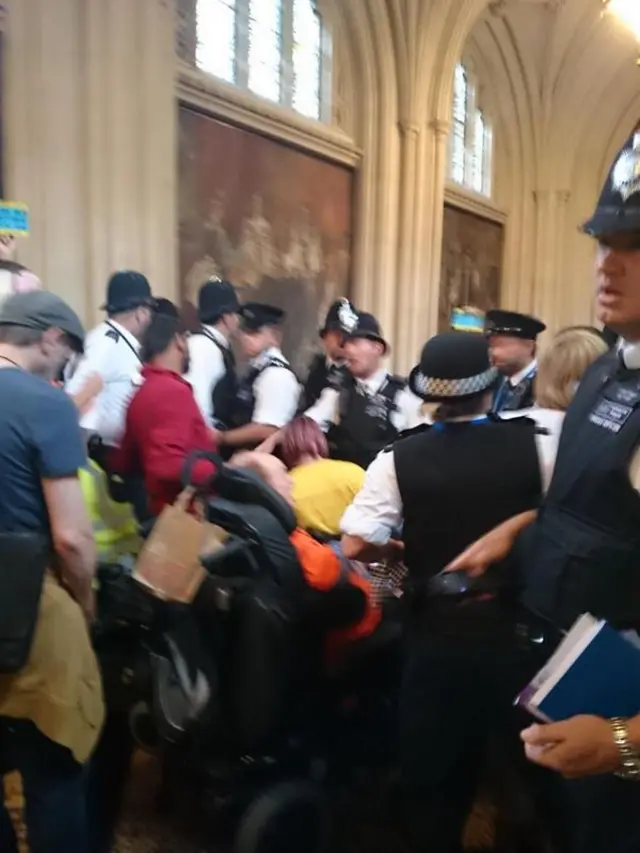 Image source, Kate Belgrave
Image source, Kate BelgraveOne disabled person told me privately a few weeks ago that pictures of disabled people being physically removed by police would no longer remain a thing of the past – something confined to the 1980s and 1990s as disabled people took direct action in their campaign for greater rights. Today’s extraordinary scenes in Parliament suggest they were right.
During Prime Minister’s Questions this afternoon, a small group of disabled people and their personal assistants attempted to gain access to the Commons Chamber, but were prevented from doing so by Police. They then occupied the Central lobby, where some were pictured being forcibly removed by police and parliamentary security.
The protestors were campaigning against the closure of the Independent Living Fund on 30th June, which they claim will result in many of the 18,000 recipients losing much of their current social care provision.
The government has previously stated that the money from the ILF will be passed to local authorities, who have a statutory responsibility to provide social care, and that support needs will continue to be met.
Whichever side of the fence they fall, politicians and campaigners alike know that images of wheelchair-users being manhandled by the authorities make for strong PR and uncomfortable viewing, which seems to be supported by broadcasters from both the BBC and ITV reporting that they were told to stop recording images and audio of the protest.
If today’s scenes in Parliament mark a change in strategy – and disability campaigners have suggested to me that it might – then scenes like today may well prove that this particularly problematic form of protest is something we may well see more often.
 Duncan Weldon
Duncan Weldon
Economics correspondent
A bucket of cold water just got poured over the optimism.
The creditors have presented a new plan to Greece - one that rather than skirting around red lines pushes Greece firmly across them. It involves VAT rises and actual cuts to pension payments.
It may be that something can be agreed at the last moment but the signs right now aren't great.
The key decision makers now are the ECB. They've been happy to extend emergency support to Greece's banks to keep them alive as long as a deal seemed close. If that attitude changes, the banks are in trouble and capital controls are close.
The big questions are: what is the attitude of the ECB? And if the (not so-) veiled threat is: "agree to this or we kill the banks", then how do the Greeks respond?
This might be a last flash of brinksmanship - this time from the creditors - or it might be the beginning of the end.
The next few hours are crucial.
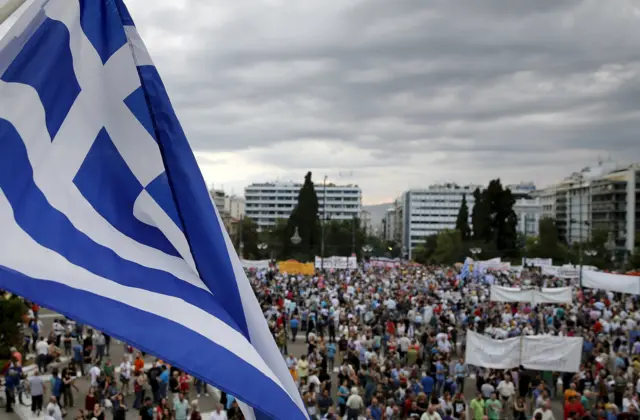 Image source, Reuters
Image source, Reuters Lewis Goodall
Lewis Goodall
Newsnight producer
Bash the bonapartists screamed the Labour leader! No! They’re our partners and I love their claret, the PM subliminally replied. Yes this week we were back to 1789, 1815 and 2003 as the Labour leader seemed determined to goad the Prime Minister to indulge in a bit of good old fashioned bonapart-bashing. But the PM, in no mood to attack the cheese-eating-surrender monkeys did an unusual thing for a British leader and resisted. He emoliently responded (doubtless with the ever-lengthening shadow of renegotiation in mind) that the Frenchies are our sound partners with whom we should work more closely. Bon amis all round (try telling to that to Deputy Mayor of Calais Dave, who says it’s all your fault).
The PM was on a stickier wicket with Harman’s second round of questioning. Using ammunition from the saintly IFS she asked whether it was possibly conceivable that any employers would increase their pay paid to their mimimum wage workers by 25% overnight to compensate for the prospective loss of in-work tax credits. The PM responded in general terms, unsure how to answer the specific point. Note there was no denial that this is going to happen. Given that working-tax credits costs some £30bn a year, they will have to be reduced if the PM wants to make the £12bn in welfare savings he promised in the election. Harman quipped that the PM doesn’t have to budget (the niece of the Countess of Longford by contrast is notoriously hard up) and that he was going to make some of the poorest employed people in the country worse off still. This is surely going to be the focus of Labour’s attack on the July budget and the theme of the summer until a new leadership is in place.
More broadly we’re now four PMQs in to the new parliament and something is now very striking. The new parliament seems curiously indifferent to the collapsing world around us. Repeating a pattern largely upheld in recent weeks, aside from Calais, not a single question from the backbenchers on either side about Greece or the Mediterranean migrant crisis or the creeping plague of IS in the Middle East. Even the new chairman of the Foreign Affairs Select Committee used his question to ask about how to best protect the Foreign Office budget rather than any great foreign policy issue. Instead the new sessions are replete with worthy questions on local road bypass upgrades, rural broadband and small-business rate relief. All important, all very proper but yet, from the mother of parliaments, at a time of global turmoil, astonishingly parochial.
Backbencher of the Week: Antoinette Sandbach, for having a name which will allow sketchwriters to have endless ‘Let them eat cake’ jokes.

No cake jokes please
 Laura Kuenssberg
Laura Kuenssberg
Newsnight Chief Correspondent
 Duncan Weldon
Duncan Weldon
Economics correspondent
The IMF can't sign off any deal that it views as "unsustainable". Over the past 48 hours, the Fund has been fretting that the deal on the table wouldn't prove sustainable. Specifically that the large tax rises the Greeks are proposing (income taxes on higher earners, VAT rises, corporation tax hikes and increased pension contributions for firms and workers) will hit the already weak economy hard. Lower Greek GDP would mean a higher ratio of debt to GDP.
In theory there are two ways to solve this issue - both of which are politically fraught. Either the creditors could agree to write downs in debt (not something the European finance ministers can agree to straight away) or Greece would need to present a modified plan (difficult domestically).
There may though be a third way through - if Juncker can pledge to direct €35bn of new European Union funding towards Greece and Draghi can say that Greece will now be included in ECB QE, then that might be enough to allow the IMF to say the economy will grow enough to make the debt/GDP ratio sustainable.
That'd be fudging the issue - grand European economic plans usually over promise and under deliver (and are usually behind the timetable) - but at this stage it's in the interest of all the players gathering in Brussels to prevent a deal falling apart.
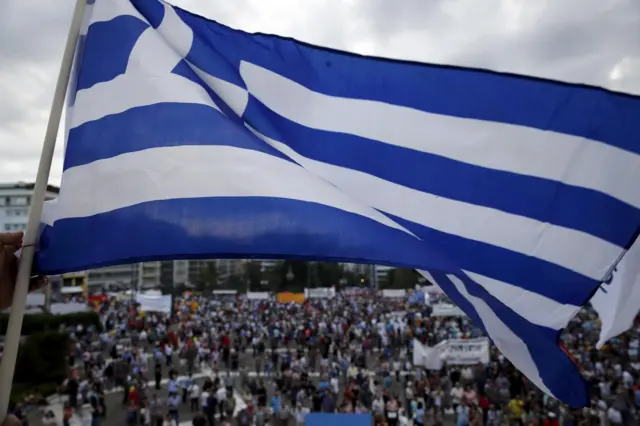 Image source, Reuters
Image source, Reuters